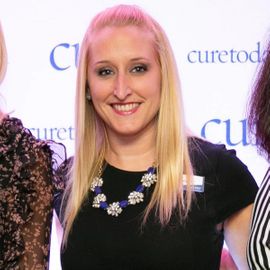- About Us
- Advertise / Support
- Editorial Board
- Contact Us
- CancerNetwork.com
- TargetedOnc.com
- OncLive.com
- OncNursingNews.com
- Terms & Conditions
- Privacy
- Do Not Sell My Information
- Washington My Health My Data
© 2025 MJH Life Sciences™ and CURE - Oncology & Cancer News for Patients & Caregivers. All rights reserved.
It's All in the Family: Discussing Cancer Risk with Extended Family Members

Kristie L. Kahl is vice president of content at MJH Life Sciences, overseeing CURE®, CancerNetwork®, the journal ONCOLOGY, Targeted Oncology, and Urology Times®. She has been with the company since November 2017.
One family shares their experience with the discovery of a BRCA mutation, and how they discussed it among one another.
It started on Feb. 1, 1956. Annie and Dave Bushman’s mother had passed away, but at the time, it was never discussed from what. The siblings would go on many years later to find out it was actually from cancer, and in turn, it would affect their entire family.
“It starts with our mother, who was one of nine children. She died of breast and ovarian cancer at age 42. She had a sister who died of breast cancer at 34, another who died of ovarian cancer at 35. Those siblings who didn’t die of cancer passed the mutation along to their children and grandchildren and so on,” Dave explained during a session at the 11th Annual Joining FORCEs Against Hereditary Cancer Conference held in San Diego from Oct. 19-20.
Annie first looked back on the day her mother passed. She was 8 years old and walking home from school when her father came to get her. Upon returning home to their family’s apartment in the Bronx, New York, her relatives were all around, yet no one said a word.
“I don’t even know if we had a conversation. I kind of knew my mother had passed, but we didn’t really talk about her (or how she died),” she said.
Fast forward to 1994, Annie came across a book, titled “Motherless Daughter,” which inspired her to look in to the cause of her mother’s death. Many years later, after visiting a specialist at Mount Sinai in New York City, she learned of her mother’s cancer diagnosis and was urged to undergo genetic testing, and as a result, discovered she was BRCA-positive in 2010.
It was then, she called her brother to tell him that he too would need to get tested. Low and behold, Dave tested positive for the BRCA gene. The first thought that ran through his head was, “I have to tell my children.”
Dave’s daughter, Dana, and Annie’s daughter, Carrie, both underwent testing and learned of their BRCA diagnosis around the same time; however, both took different routes. While Dana underwent preventive surgeries, her cousin chose active surveillance. Unfortunately, Carrie was diagnosed with triple-negative breast cancer in 2013, but recently celebrated her five-year anniversary of being cancer-free.
While all of this was happening, Dave also reached out to his cousins to have what they thought was a family reunion, but in actuality was a way to get everyone together to discuss their diagnosis. “It was like, ‘Let’s have bagels and BRCA!” Annie said jokingly. “Dave made this huge family chart, and everyone was walking over (to look at it), and once we had everyone’s attention (we let them know) what was going on.”
It was then that Dave and Annie’s first cousins, Julie and Sheila, got tested and also received positive test results for the BRCA gene. As Sheila was being screened before her oophorectomy, her doctors discovered a 9-centimeter mass in her ovaries, diagnosing her with ovarian cancer. After four-plus years, Sheila unfortunately passed from the disease.
Meanwhile, Julie was on the fence about what to do. When her sister was diagnosed with ovarian cancer, Julie chose to also undergo an oophorectomy; however, she still sat on what to do with her breasts. Eventually she was diagnosed with stage 2 breast cancer in 2013 following a mammogram and sonogram. Since, Julie is cancer free and a five-year cancer survivor.
“Finding out that we are BRCA-positive, it gave my sister much better quality of life and it saved my life,” she said.
Although not directly related, the Bushman’s story actually prepared Dave’s wife, Jessie — who is not BRCA-positive — for her eventual breast cancer diagnosis.
“(My daughter) shared a lot of her journey with me … and I’m so proud of the way she has handled things and the way she shares everything,” Jessie said. “I’ve learned a lot about breast cancer. And being one out of eight women in the U.S., I did get breast cancer. I was well prepared because of what I learned from coming to conferences (like the FORCE Annual Meeting) and dealing with the members of my family who did have the gene.”
Related Content:



